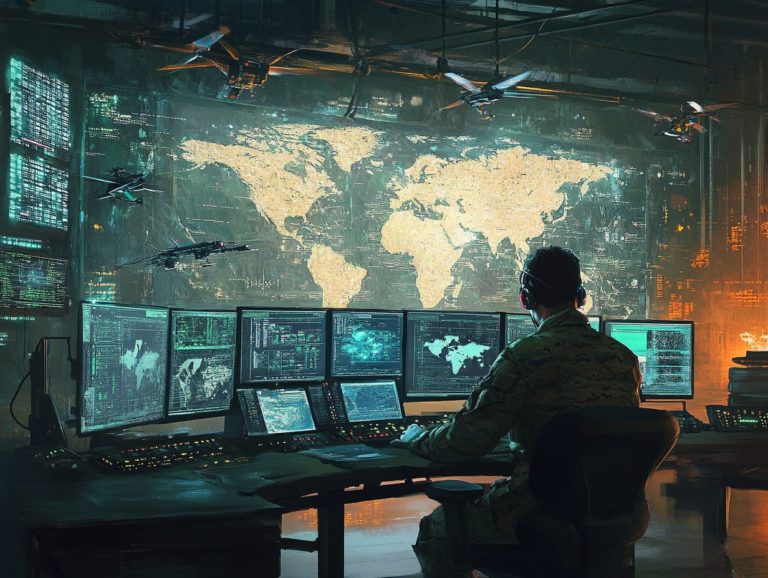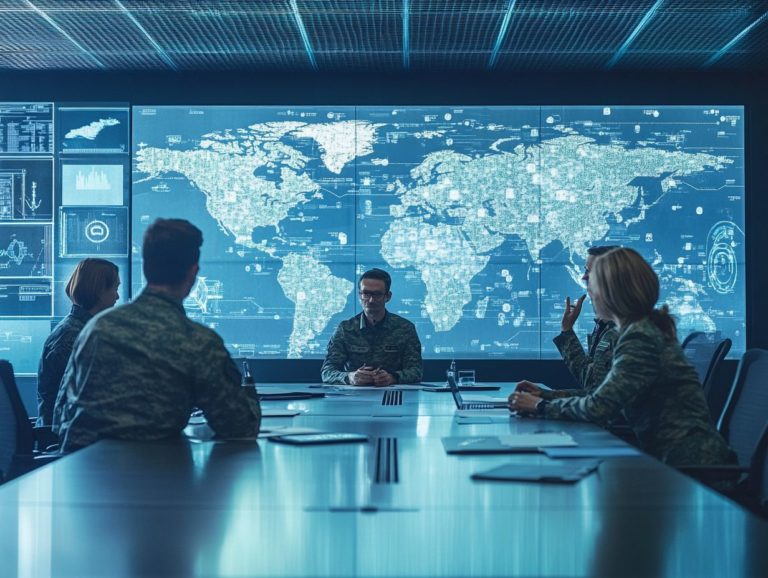Understanding the Role of Technology in Defense
The landscape of defense technology has experienced a remarkable transformation. It has evolved from the rudimentary tools of warfare in ancient times to the sophisticated systems that now shape modern military strategies.
This exploration delves into the journey of technological advancements in defense. It highlights key innovations and their benefits in enhancing military operations and safety, while also addressing the ethical dilemmas they present.
As you look ahead, consider the future possibilities and challenges that await in the realm of defense technology. Engage with this complex and vital topic as we unpack its many facets together.
Contents
- Key Takeaways:
- The Evolution of Technology in Defense
- How Technology is Changing Defense Today
- Benefits of Technology in Defense
- Challenges and Controversies Surrounding Technology in Defense
- The Future of Technology in Defense
- Frequently Asked Questions
- What is the role of technology in defense?
- How has technology impacted the defense sector?
- What are some examples of technology used in defense?
- What are the benefits of using technology in defense?
- Are there concerns about relying too heavily on technology in defense?
- How is technology constantly evolving in the defense sector?
Key Takeaways:
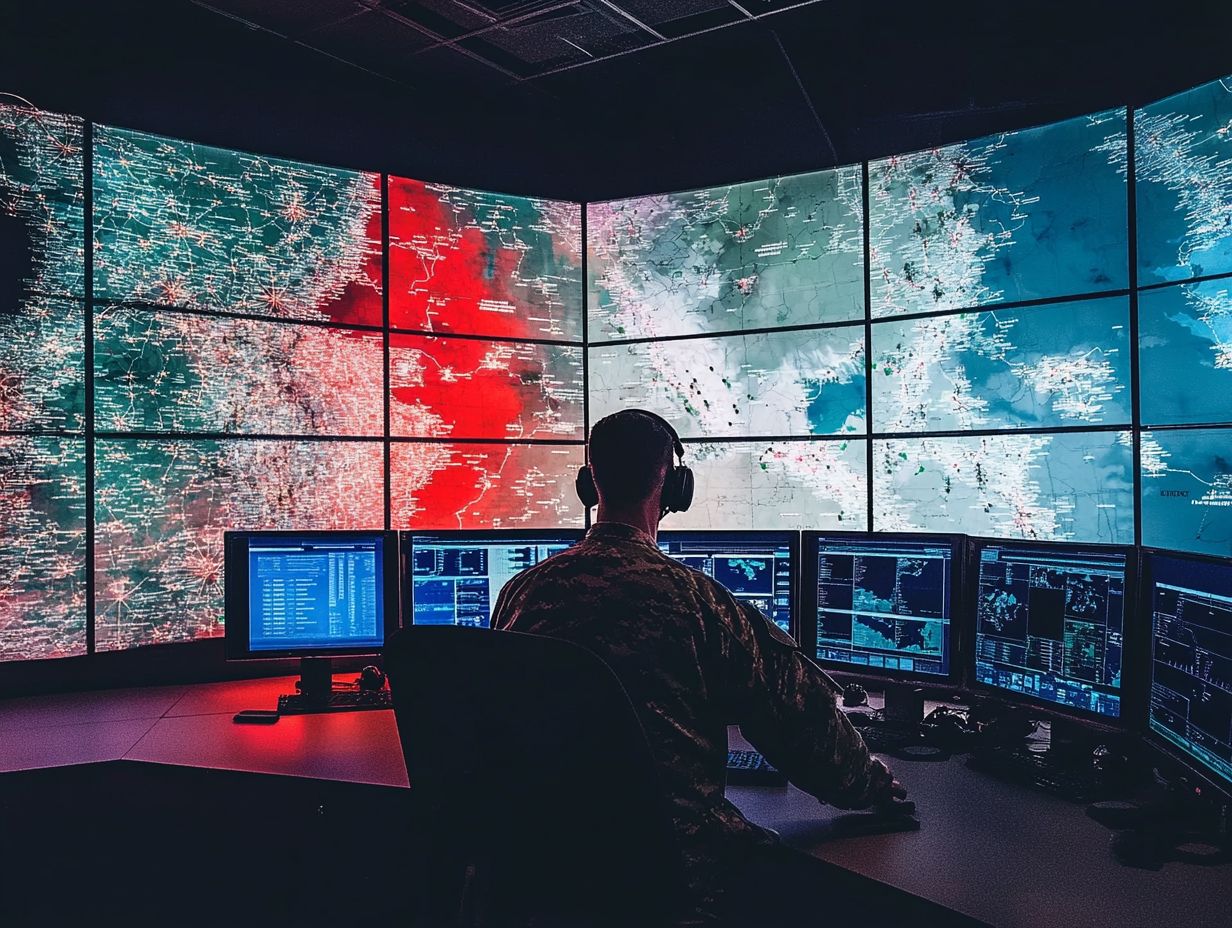
Technology has played a crucial role in the evolution of defense from ancient times to modern day. It constantly improves the capabilities and tactics of military operations.
Current advancements in technology, such as artificial intelligence and drones, have significantly impacted defense by enhancing efficiency, accuracy, and safety.
Despite its benefits, the use of technology in defense raises concerns about ethics and potential misuse. It highlights the need for responsible and ethical implementation in the future.
The Evolution of Technology in Defense
The evolution of technology in defense has significantly influenced the military scene, especially in the United States. Advancements in intelligence, combat systems, and operational capabilities demonstrate a persistent adaptation to emerging threats.
As you explore the journey from ancient warfare techniques to the complexities of modern digital warfare, it becomes clear that the integration of cutting-edge technology has greatly enhanced military effectiveness and strategic advantages.
Today, technologies such as sensors, data analytics, and automated systems are essential components of defense operations. They enable real-time decision-making and enhance the safety of personnel involved in combat scenarios.
From Ancient Times to Modern Day
From ancient times, when simple weapons served as the cornerstone of military power, to today’s combat scenarios defined by cutting-edge technology, your understanding of military evolution reveals a remarkable journey.
This transformative path showcases pivotal milestones like the introduction of gunpowder in the 9th century. It revolutionized warfare by paving the way for firearms and cannons.
As you move through the centuries, the Industrial Revolution emerges as a game-changer. It enabled the mass production of weaponry and innovative machinery that fundamentally altered battle tactics.
Now, fast forward to the 20th and 21st centuries, where digital advancements such as drones, cyber warfare, and artificial intelligence are reshaping strategic planning and battlefield dynamics.
This creates a complex landscape of modern warfare, one that was simply unimaginable in earlier eras.
How Technology is Changing Defense Today
Current technological advancements in defense are reshaping military operations. They seamlessly integrate cutting-edge systems and intelligence capabilities.
This evolution significantly enhances overall performance and responsiveness to threats. It ensures that you are always one step ahead in a rapidly changing environment.
Key Innovations and Their Impact
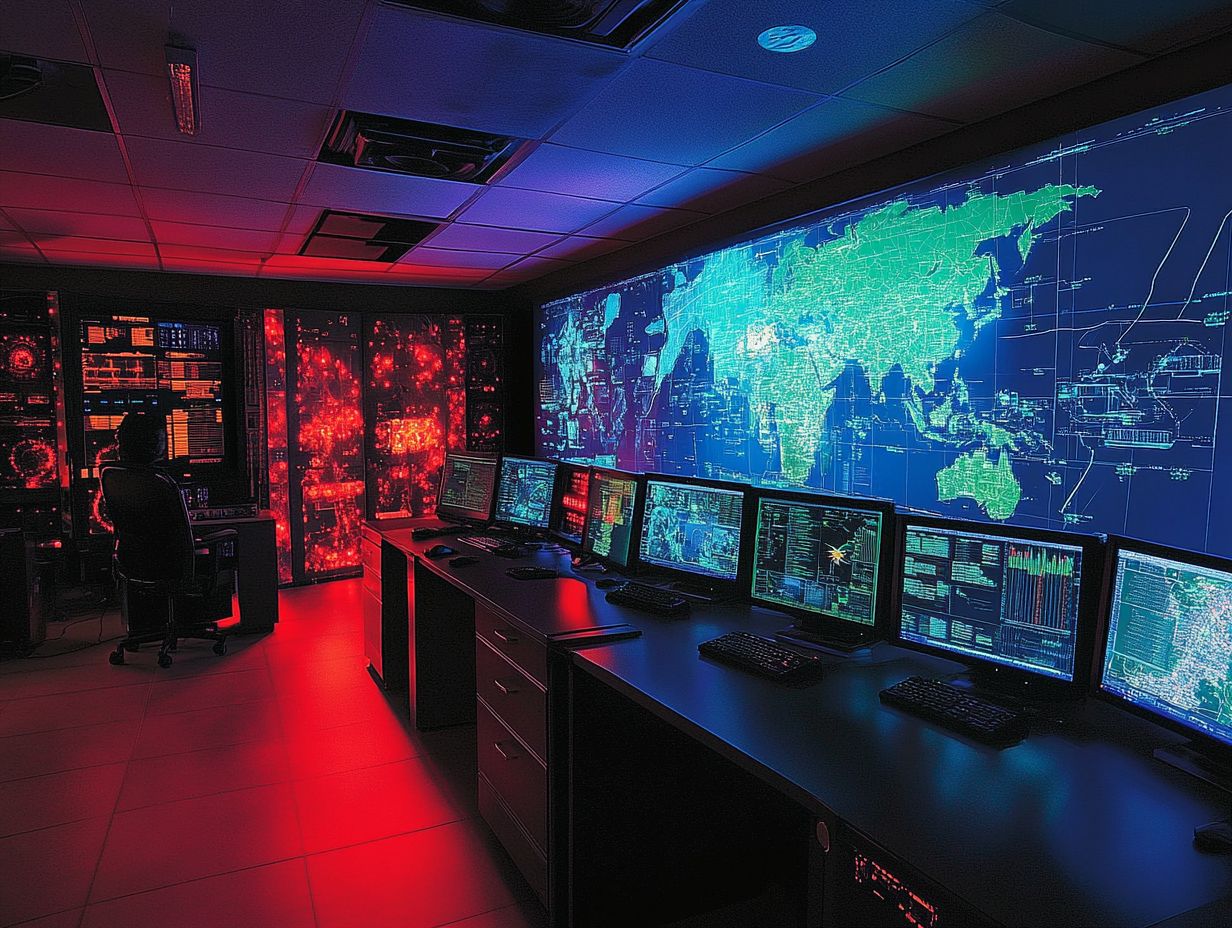
Key innovations in military technology, such as unmanned aerial vehicles (UAVs) and advanced sensors, have significantly transformed defense operations. They enhance your surveillance and precision targeting capabilities.
These advancements revolutionize traditional combat tactics and equip you with essential tools to tackle emerging threats in conflicts where opposing forces have unequal resources.
As warfare becomes increasingly complex and the demand for real-time intelligence rises, these technologies enable you to operate more efficiently across diverse environments.
The integration of artificial intelligence into drone operations further refines your decision-making processes. It allows for swift responses to dynamic battle scenarios.
As a result, these innovations are crucial in ensuring your operational superiority and maintaining national security amidst an ever-evolving global landscape.
Benefits of Technology in Defense
Technology in defense does more than boost combat. It transforms how military operations and safety are approached, cultivating a more efficient and responsive defense environment for you.
Improving Military Operations and Safety
Military operations have evolved remarkably due to technological advancements. Innovations like real-time data analysis and automated systems significantly enhance safety protocols.
These developments enable swift integration of information from various sources, allowing commanders to make informed decisions in critical situations.
Take, for instance, the deployment of drones. Drones provide live aerial surveillance a valuable asset during reconnaissance missions.
Virtual reality (VR) simulations, such as those utilized by the U.S. Army, offer soldiers immersive training experiences that replicate complex battlefield scenarios without the inherent risks.
Decision support systems, enhanced by artificial intelligence, analyze potential threats. This allows personnel to strategize effectively during live operations.
This not only reduces casualties but also improves overall operational success rates.
Challenges and Controversies Surrounding Technology in Defense
While integrating technology in defense offers numerous advantages, it also presents a range of challenges and controversies. Ethical concerns surround the use of automated weapon systems and cybersecurity threats that put sensitive military information at risk.
Ethical Issues with Military Technology

Ethical concerns surrounding military technology often center on the potential misuse of automated weapons systems. It prompts reflection on accountability and the implications of allowing machines to make lethal decisions.
As society increasingly integrates advanced algorithms and robotics into defense strategies, it becomes essential to consider who ultimately bears responsibility for these decisions.
The shift toward automation in military operations presents dilemmas regarding the reliability of artificial intelligence in making life-and-death choices. This raises the specter of emotional detachment as human oversight diminishes.
The deployment of such technologies sparks urgent discussions about adherence to international law and human rights. Military forces face the challenge of maintaining moral agency in an era of autonomous warfare.
These pressing ethical debates highlight the necessity for transparent policies and frameworks. They should guide the implementation of military technologies, ensuring that humanity’s values remain at the forefront of technological advancement.
The Future of Technology in Defense
Get ready! The future of technology in defense is about to change dramatically. Predictions suggest a growing reliance on artificial intelligence, better data capabilities, and groundbreaking innovations in military systems.
As you navigate this evolving landscape, it’s essential to recognize the profound impact these advancements will have on security and operational effectiveness. Embracing these technologies will redefine defense strategies and enhance overall readiness for emerging challenges.
Predictions and Possibilities
Predictions for the future of military technology indicate a heightened focus on automation and data analytics. Expect remarkable advancements in operational capabilities and efficiency.
As these innovations emerge, it will be intriguing to see how artificial intelligence reshapes simulation training. Soldiers will participate in environments that are not only more realistic but also highly adaptive.
Imagine enhanced logistics driven by automation. This could streamline supply chains, ensuring that troops receive vital resources more swiftly and accurately than ever before.
The integration of advanced data analytics may offer military strategists intricate insights. This enables them to make more informed decisions during operations.
These advancements promise to elevate readiness and responsiveness while fundamentally transforming modern warfare. Success will become increasingly dependent on sophisticated technological tools.
Frequently Asked Questions
What is the role of technology in defense?
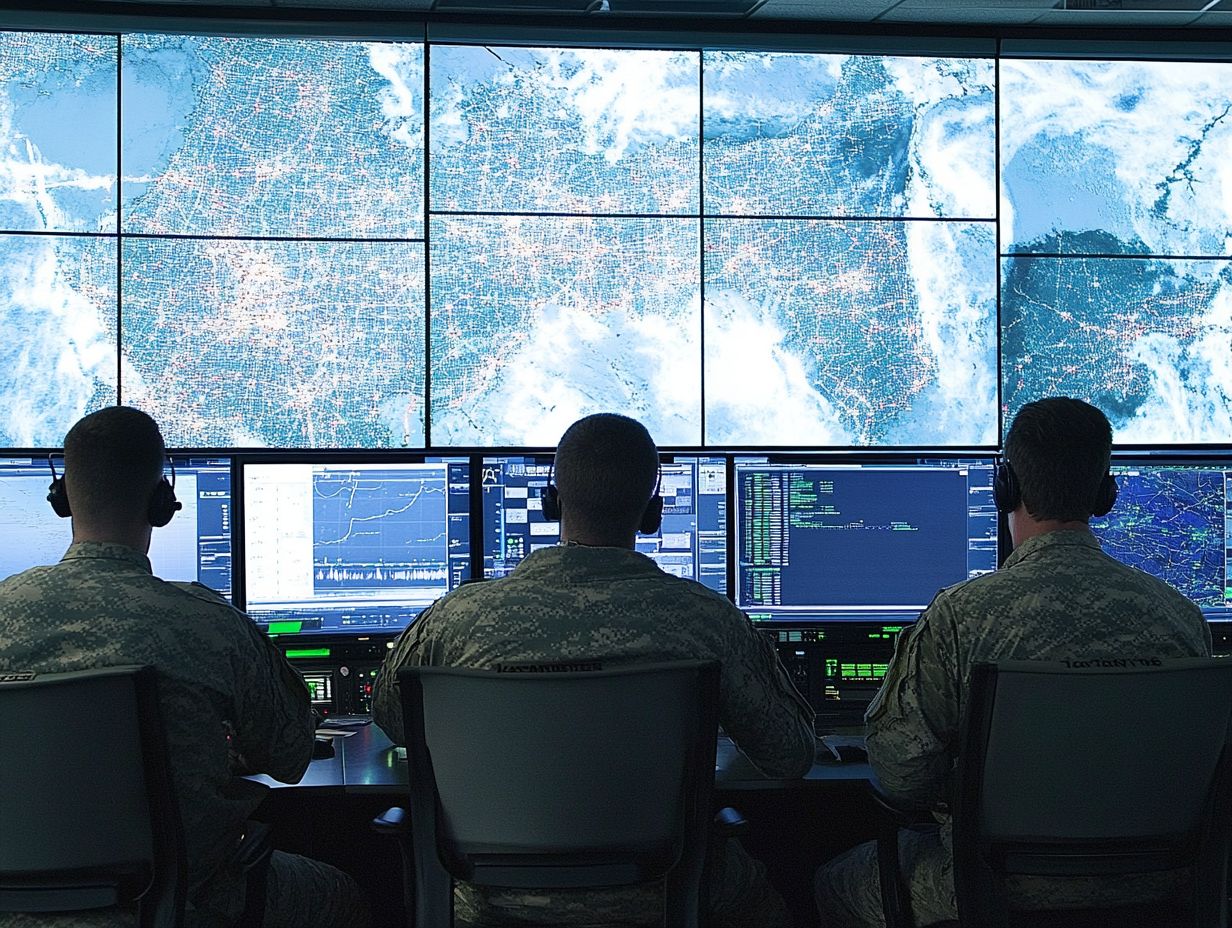
Technology plays a crucial role in defense by providing advanced tools and equipment for military operations, intelligence gathering, and communication.
Don’t miss the chance to explore these game-changing technologies!
How has technology impacted the defense sector?
Technology has transformed defense capabilities. With it, we can detect, monitor, and respond to threats more quickly and accurately.
What are some examples of technology used in defense?
Examples of defense technology include drones for surveillance, cyber defense systems to protect data, radar systems for tracking, advanced weapons, and effective communication tools.
What are the benefits of using technology in defense?
Technology improves accuracy and safety for military personnel. It also boosts operational efficiency.
Are there concerns about relying too heavily on technology in defense?
Yes, overreliance on technology can make systems vulnerable to cyber attacks. It might also limit the use of traditional tactics and skills.
How is technology constantly evolving in the defense sector?
Technology evolves rapidly in defense. Ongoing research leads to new systems that address emerging threats and challenges.




